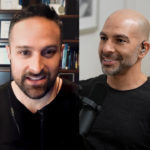To date, there is very little strong evidence on nutrition and aging, with perhaps the exception of protein consumption. Yet despite the many studies investigating the relationship between protein intake and aging, debate nevertheless continues to rage over whether dietary protein has a net positive or negative effect when it comes to human longevity. As many reading this will be aware, I am in favor of increasing protein intake well above the recommended dietary allowance, but advocates of low-protein diets cite concerning effects on the mammalian target of rapamycin (mTOR) and IGF-1. So what should we make of these data? And why do I still maintain that protein intake is an important part of nutrition for healthy aging?





At age 71, I was diagnosed with IBD-D, specifically collagenous colitis (microscopic colitis). I am on a low-FODMAP diet under the directives of a registered dietician who has extensive training on the FODMAP diet. Can you please offer a course on this topic and how diet, meds and other lifestyle changes impact the course of this disease. Thank you!
Totally agree with more protein! Especially as you age. One question I’ve always had…if you supplement with good quality amino acids (not BCAAs) does this count towards your protein intake in a day? My goal is around 125g of protein – not always easy to consume in a day.
You currently are taking Rapamycin correct? This medication reduces mTOR 1 so you have the best of both worlds- eat higher protein and take Rapaymcin weekly?
Also Peter you mentioned in a podcast you have the thalassemia minor trait, I also have the trait, 2 years 6mg of Rapaymcin has actually reduced my MCV and increased my RDW significantly- I stopped taking Rapa and they are back to normal.
Ummmm, sounds like caviling to me.
Bottom bottom line – try it and see. There are lots of surrogate markers like weight and muscle mass that could be monitored in a short term study.
How does this jive with the data coming from the study of blue zones where it seems that most centenarians eat a plant based diet that is low in protein?
Interesting point. However, one of the most important aspects of the blue zones is their overall active lifestyle, lack of access to processed foods, social connections and lower stress. It isn’t just one thing that contributes to longevity. They are also on average eating fewer calories.
I had the same question. Even the groups who ate animal products were consuming them at low volume. My guess is they were eating below the US daily recommendation for protein. What is the impact of consuming high quantities of animal protein on vascular health?
Thank you for the informative article.
Are there underlying health conditions for which you would recommend a diet low in protein? For example, might a middle-aged man with a high calcium score (183) but no symptoms of AVSD disease (that’s me!) want to avoid animal protein with saturated fats?
I’m 66 and have a calcium score of 190…how do you know you have no symptoms of AVSD disease, what would the symptoms be?
Thank you.
The need for increasing protein as we age makes total sense to me. As a 63-year-old post-menopausal woman, I’m seeing IRL how much harder it is than even five years ago for me to build and maintain muscle.
My dilemma is this: I’m a kidney donor (2017) and I can’t unhear my donor coordinator telling me that high-protein diets would be a no-no post-donation. As of my last blood panel, my creatinine was 1.13 and eGFR 55. I know I have to be more mindful to doing my part to maintain kidney function. How do people like me balance that with increasing protein intake?
PA thank you… Great scientists and passionate educator. Through his teaching and public outreach, he aims to inspire the human generation and create a more informed and scientifically curious society.
Sincerely Sophie
Personally after spending many decades as a student of nutrition, and as a body builder and personal trainer in my past, my rule of thumb on protein intake is as follows:
Healthy individuals with low to moderate exercise routines: 1 gram of protein per day, per lb. of body weight. example 160 lbs. person = 160 grams of protein per day.
Healthy individuals with intense weight training routines or high-intensity exercise programs, up to 1.5 grams per day per lbs. of bodyweight.
For anyone with compromised kidney function or who is otherwise unhealthy, please consult your healthcare provider.
Love it, useful for we oldies
You suggest inhibiting chronic activation of mTORC1 through other means, such as rapamycin. Why continually rely on medications for healthy longevity? Why is a medicated life often considered superior to non-medicated? Why not start with natural healthy as the default *then* a medicated life if one so chooses? I’d much rather sacrifice some lifespan, while doing what’s possible via exercise, diet and lifestyle for health, than rely on increasingly more exogenous supplementation.
This was a useful and informative article for people my age. It prompts me to add how much I would enjoy seeing more content — especially in episodes of The Drive — aimed at older subscribers, and in particular, those that could be described as late bloomers. For example, I have found the centenarian decathlon to be an indispensable framework for decisions about extending lifespan and health span, one that is flexible enough to be of help to 25-year-olds and 75-year-olds. But I think some of us who, like Peter’s patient Barry, didn’t get the message until their Medicare years, could use targeted advice about fine-tuning their routines. I am certain from my own experience that folks who were metabolic messes at retirement and beyond can achieve remarkable turnarounds, but perhaps our expectations and risk-avoidance strategies need to be different from those who started training for the decathlon in their 40s and never stopped. Peter’s experts do have specific advice for older listeners from time to time — Andy Galpin and Mickey Collins come to mind — but it would be great to have occasional interviews with gerontologists or geriatricians devoted to the special problems of older subscribers, and in particular to help those who were pretty late to the party apply Peter’s lessons appropriately.
How about interviewing 100 100 year olds and take a deep dive into what they’ve done their entire lives. Maybe annecdotal but would resonate more with me.
I am a bit dubious about eating so much animal protein and especially adding protein supplements to my diet. I have never read about anyone dying from protein deficiency and once read that 8% of my caloric intake would be more than enough protein. Given that animal protein puts pressure on the kidneys and that evolutionarily, we and our, supposedly, ape cousins, were mostly plant and fruit based eaters, I have to be skeptical. Finally, regardless of whether falls cause more deaths, I am more afraid of cancer, which I understand is constantly floating around in our bodies until our immune system eliminates them. Anecdotally, I am 68, eat a Mediterranean diet with an emphasis on vegetables and have never had a problem gaining muscle mass or strength as long as I do resistance training and HIIT. Alas, that is the rub. I hate exercise with a passion. I find it boring, time consuming and painful.
Like Calvin, I have been dubious about eating so much animal-protein, given that our ape cousins were mostly plant and fruit based eaters. On the other hand, I recently realized that our unique ability to hunt means that humans have been consuming much more animal-protein for hundreds of thousands of years. That feels like it should be evolutionarily significant.
This really sets up apart from all our primate ancestors. I imagine that the extra protein is healthy as long as the body is using it for active living, i.e., sufficient exercise. On the other hand, consuming so much protein while living a sedentary lifestyle would be unnatural in the wild, and thus unhealthy.
Thank you so much Peter. Excellent article. Being in the post-65 age group, I am vitally interested in this topic.
Just wondering though about the role of caloric rather than protein restriction in this paradigm. Is it desirable, or even possible, to maintain adequate protein intake but keep mTORC1 in check with caloric restriction?
Extraordinary article, very enlightening, I am 73 years old and struggle hard to follow your advise, I red your book and loved it but you write for the 45-55 bracket. Consider that I might be in my marginal decade, this article helps me, some others ie. excercise ones I can not keep up but try.
It would be great to get some experts on your podcast that can talk about the gut microbiome/microbiota and healthy aging.
There is lots of emerging evidence of a gut-muscle axis that really needs to be included in the healthy aging vs high protein argument.
Search “gut-muscle axis” on PubMed for some interesting reads.
An easy to digest (no pun intended) systematic review on the gut-muscle axis and endurance athletes:
Mach and Fuster-Botella, 2016
Clarke et al, is also a good read. Also there’s a really interesting study on rugby players, their diets(high in protein and fats) and gut microbiomes (sorry, author escapes me).
Diversity also comes from close proximity to others, social interaction so maybe explains some of their differences (the scrum, bath together etc) versus ‘lone’ athletes? And may part explain why isolation and institutions in old age may impact health via the gut microbiome.
interesting article. It is a pity that there are no figures on the allowences in g protein/kg weight…., there are many different recommendations, this makes difficult to decide what protein intake to aim at
Thank you again Peter for a nuanced look at the topic. Like others above, I have always been intrigued by those living in the Blue Zones whose inhabitants seem to demonstrate that a high protein intake is not a *prerequisite* for a long and healthy life. (Although that does not prove the opposite to be true either.)
Great read. I also wonder if higher protein intake in the context of lower carbohydrate intake and resulting low levels of insulin would address some of the potential downside related to long term mTORC1 regulation. For that matter, I wonder if insulin and amino acids have different effects on mTORC1 depending on how long they are inherently present in tissues, and even depending on which type of tissue they’re in.